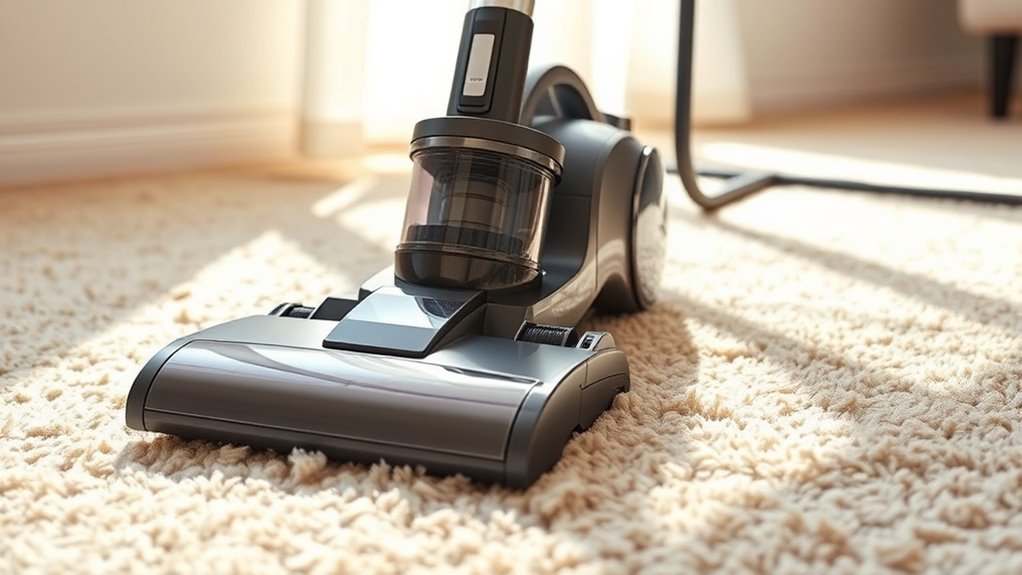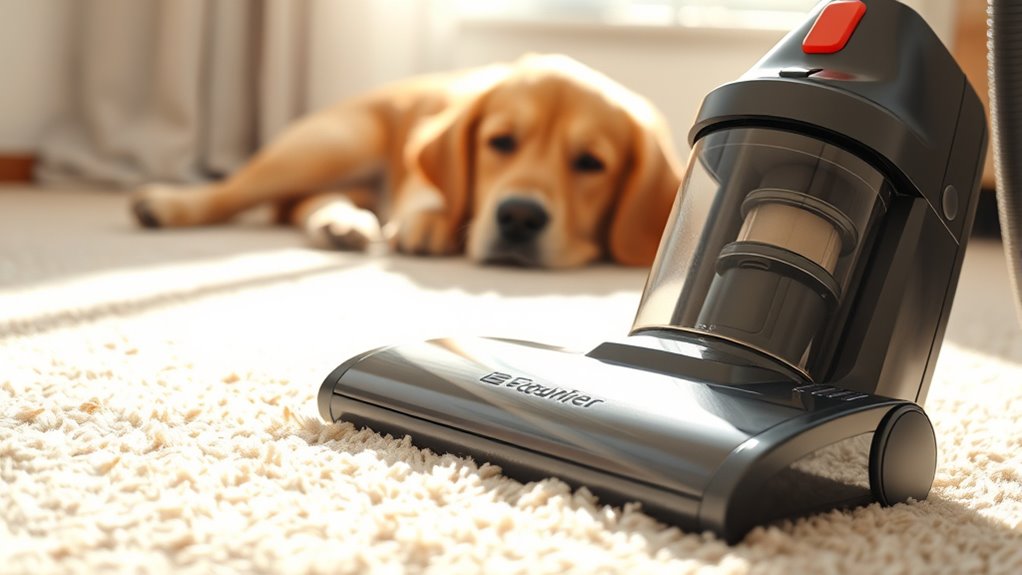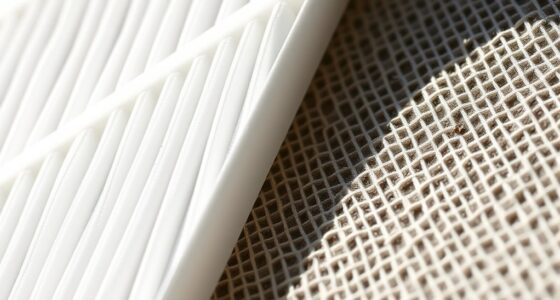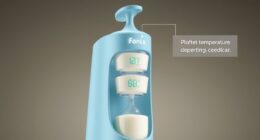Regular vacuuming helps reduce surface pet odors by removing hair, dander, and dirt that trap smells. However, it can’t fully eliminate deeper or airborne odors that originate within fibers or linger in the air. For long-lasting results, you need to combine vacuuming with other methods like air purifiers or odor-neutralizing products. Keep going to discover effective strategies that can help keep your home fresher for the long term.
Key Takeaways
- Vacuuming removes surface pet hair, dander, and dirt but can’t fully eliminate odors trapped deep in fibers.
- Regular vacuuming reduces odor-absorbing particles but may not eliminate persistent or airborne pet smells.
- Combining vacuuming with air purifiers enhances odor removal by targeting airborne molecules.
- Odor-neutralizing products and baking soda application improve long-term pet odor control alongside vacuuming.
- Consistent cleaning and air filtration strategies can help achieve more permanent pet odor reduction over time.

Have you ever wondered how to effectively eliminate stubborn pet odors from your home? Many pet owners turn to vacuuming as a quick fix, but the question remains: can regular vacuuming truly reduce pet-related odors permanently? The answer depends on how you approach it. While vacuuming is essential for removing pet hair, dander, and dirt that trap odors, it alone often isn’t enough to eliminate persistent smells completely. To truly tackle pet odors, you need a combination of cleaning strategies, including the use of an air purifier and proper odor absorption techniques.
Vacuuming helps lift loose pet hair and dander from carpets, rugs, and upholstery, which are major sources of pet-related odors. However, these particles can settle deep within fibers, making them difficult to remove with vacuuming alone. When you vacuum thoroughly and regularly, you reduce the amount of odor-absorbing particles in your home, but the smell may still linger if the source isn’t fully addressed. That’s where an air purifier comes into play. An air purifier equipped with a HEPA filter and activated carbon can capture airborne pet dander, hair, and odors, improving your home’s air quality considerably. This device works by continuously pulling in air, trapping odor-causing particles, and reducing the scent’s persistence. Using an air purifier in conjunction with vacuuming creates a two-pronged approach—removing particles from surfaces and filtering out airborne odors.
Additionally, odor absorption is an essential part of long-term odor control. You can enhance this process by applying baking soda to carpets before vacuuming or using specialized odor-neutralizing sprays. These products absorb and break down odor molecules at their source, making your home smell fresher. Regularly replacing filters in your vacuum cleaner is also important, as clogged filters won’t trap odors effectively. Consider using vacuum bags with odor-absorbing properties or switching to a vacuum with a built-in air filtration system. Moreover, understanding the role of AI-powered technology in enhancing cleaning efficiency can further improve odor management by providing insights and automation.
While vacuuming helps manage pet odors, it shouldn’t be solely relied upon for permanent elimination. Consistent cleaning, combined with an air purifier and odor absorption techniques, is necessary to reduce smells over time. Remember, pet odors often originate from deep within fibers and in the air, so addressing both surfaces and airborne particles provides the best chance of long-lasting freshness. If you’re serious about eradicating pet smells, integrating these methods will give you a cleaner, more odor-free home and make your living space more comfortable for everyone.
Frequently Asked Questions
Does Vacuuming Eliminate All Pet Odors Permanently?
Vacuuming alone won’t eliminate all pet odors permanently, but it helps markedly. Regular vacuum maintenance removes surface pet hair and dander that cause lingering smells. To truly reduce odors, combine vacuuming with carpet deep cleaning treatments, which target embedded odors and bacteria. Consistent cleaning keeps your space fresher, but for lasting results, consider professional deep cleans and other odor-neutralizing methods.
How Often Should I Vacuum to Control Pet Odors Effectively?
You should vacuum at least twice a week for effective pet odor control. Regular vacuum maintenance helps remove pet hair, dander, and soil that trap odors. Use high-efficiency filters and consider scent absorption techniques, like adding baking soda or using odor-neutralizing vacuums. This routine keeps your home fresher longer and reduces stubborn pet smells, making your space more comfortable for everyone.
Are Certain Vacuum Cleaners Better for Pet Odor Removal?
Your vacuum can be a game-changer in fighting pet odors. Some vacuums with HEPA filters and deodorizing features trap allergens and neutralize smells better than others. These specialized vacuums are like odor-fighting superheroes, making your space fresher and cleaner. Investing in a high-quality deodorizing vacuum with HEPA filters guarantees you’re tackling pet smells effectively, keeping your home smelling fresh long after the vacuuming is done.
Can Vacuuming Alone Prevent Pet Odors From Returning?
Vacuuming alone can help manage pet odors temporarily, but it won’t prevent them from returning permanently. To keep your home smelling fresh, you should also use air purifiers that filter out airborne smells and odor absorbers to treat persistent odors. Regularly cleaning and vacuuming is essential, but combining these methods offers a more effective, long-lasting solution for controlling pet-related odors.
What Additional Methods Complement Vacuuming for Odor Control?
Vacuuming alone might not keep pet odors at bay permanently. To better control smells, you can use an air purifier to filter airborne particles and odors. Additionally, enzymatic sprays break down pet stains and odors at their source, offering long-lasting relief. Combining these methods with regular vacuuming helps create a fresher environment and keeps pet-related odors from returning quickly.
Conclusion
So, can vacuuming truly banish pet odors forever? While it might not wipe out every scent permanently, regular vacuuming acts like a shield, keeping odors at bay and freshening your home. Think of it as a battle—each sweep weakens the odor’s grip, making your space more inviting. Keep at it consistently, and you’ll find that a cleaner, fresher home isn’t just a dream, but a reality you can achieve—one vacuum at a time.









